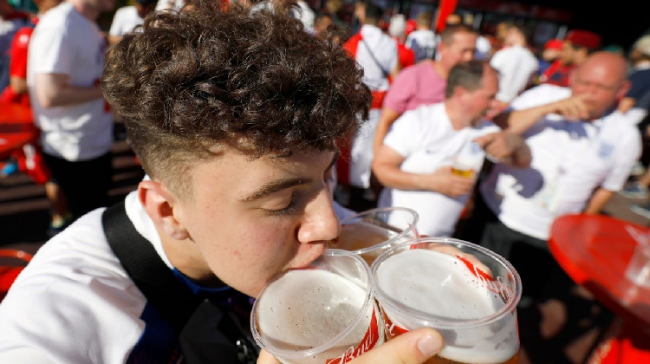Beer Cheers 2018 FIFA World Cup, Supplies Run Out In Russia

Moscow: Football fans from around the world are flocking to Russia's bars, beer gardens and craft beer pubs to quench their thirst as the World Cup heats up.
But the surge in sales will not have a lasting impact on Russia's beer industry, where consumption has been losing fizz for years -- ever since it lost its classification as a soft drink.
Russia ranks 14th in terms of annual alcohol consumption per capita, according to the World Health Organization.
But with spirits -- chiefly vodka -- traditionally playing a stronger role in social life, Russia ranks far lower at 32nd in terms of beer consumption, according to a 2016 survey by Japanese beermaker Kirin.
Part of the reason why Russians are drinking less beer now than they were in the early 2000s is because of moves to restrict sales and advertising.
Higher taxes on beer and declining consumer spending power have also contributed to the decline.
The real turning point came in 2011, when beer was classified as an alcoholic drink rather than as a soft drink.
Since then, nighttime sales have been banned, as have sales at street kiosks and in particularly large volumes.
Of all the worst things that could happen at the World Cup, running out of beer has to be the dumbest thing. "Its soccer fans. Of course they'll have enough beer!" — Jason Smith (@howaboutafresca) June 20, 2018
Since 2013, with a major economic crisis in full swing, the market has contracted more than 24 percent and is set to lose another 11 percent by 2023, according to an estimate by Euromonitor.
"Between 2007 and 2017, tax on beer grew almost tenfold," said Pavel Yerankevich, senior development director at Baltika, Russia's number one beer brand, which now belongs to Denmark's Carlsberg group.
"All that together with the unfavourable macroeconomic situation has of course influenced the state of the market," he added.
Yerankevich thinks Russia risks going too far with measures designed to prevent alcohol abuse, even as he acknowledges the problem is widespread and needs to be tackled.
"We need to find a compromise: on the one hand to put into action the government's reasonable goals of lowering alcohol abuse and reducing the sales share of strong spirits, but on the other hand, not to put up artificial obstacles to business development," he said.
The World Cup may be a "driver of growth" in beer sales, he said.
"But in this case, the increased demand will only affect this period without changing the overall annual trend," he added.
Due to the #WorldCup, several bars and restaurants in Moscow say they are running low on beer. One word: Vodka! — 7 Sports Xtra (@7SportsXtra) June 19, 2018
Yury Antonov, who heads the Ochakovo beer factory in a Moscow suburb, says sales to bars and consumers have risen ahead of the World Cup but he is downbeat about the longer term.
"We don't think that the market will stabilise any time soon. We think that the market will continue falling," he said.
All-American lager Budweiser, as the official sponsor of the World Cup, may be the only beer likely to see a strong benefit.
Budweiser, made by Belgium-based AB Inbev, is the only beer allowed in stadiums and fan zones.
Alcoholic beverage sales are banned in a two-kilometre (1.2-mile) radius around the stadiums.
The Budweiser brand has ensured its logo is highly visible at numerous spin-off events as well.
A spokesperson for Budweiser said it does not disclose specific sales figures, but described the World Cup as a "great opportunity" for the brand.
Some other beermakers are also performing better than usual, including alcohol-free brands.
In 2017, alcohol-free beer sales saw "solid growth" thanks to "aggressive marketing" by major brands, Euromonitor said in a report.
Big brands like to focus on advertising their alcohol-free beer partly because it dodges tough restrictions.
However there is a genuine "rising consumer interest and demand" as Russians become more health-conscious, the market research provider said.
The other type of beer to buck the trend is craft beer, with specialised bars and shops popping up all over Russia's larger cities.
Not even a full week into the World Cup and Moscow is already running low on beer supplies. Soccer really is the beautiful game — Kevin Dale (@KevinDale7) June 20, 2018
For the moment, craft beer is being produced only by small and medium-sized breweries.
But Euromonitor analysts expect that "larger brewers will also increasingly focus on craft beer so as to help offset losses in the lager category." Artyom Zimakov, who owns Beermood, a craft beer bar in central Moscow, said he is delighted to see his bar packed every day so far in the World Cup.
The market for his type of product is "very dynamic and it's growing," he said.
"It's going to grow fast." (AFP)




